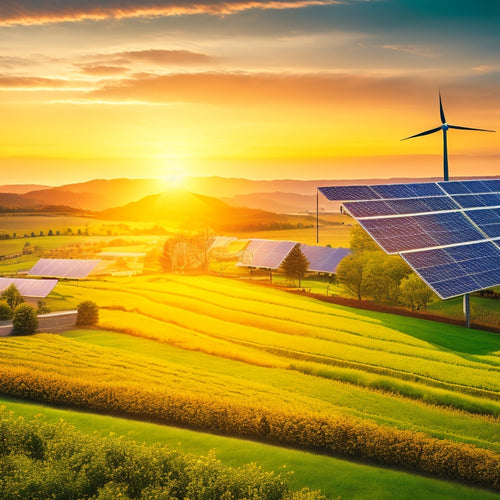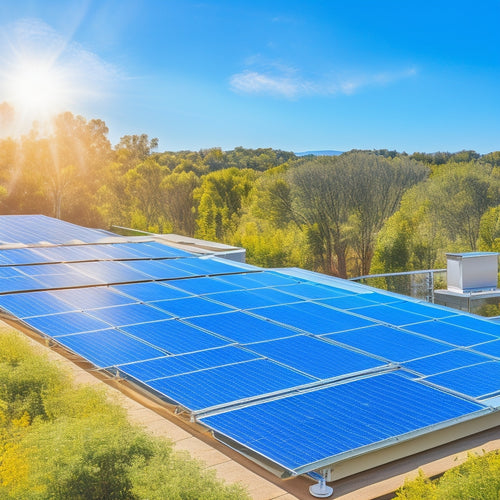
DIY Panel Cleaning Solution Recipe
Share
You can create a gentle yet effective DIY panel cleaning solution recipe by combining common household items like white vinegar, baking soda, and lemon juice. White vinegar serves as a natural disinfectant, while baking soda acts as a gentle abrasive, and lemon juice helps break down dirt and grime. This eco-friendly solution is cost-effective, reduces exposure to toxic chemicals, and is gentler on panel frames. Consider the material type of your panel frames, as different materials respond uniquely to cleaning agents. By using this DIY solution, you'll be taking a significant step towards a more sustainable cleaning routine, and exploring further will reveal even more benefits.
At a Glance
- Mix 1 cup of white vinegar with 1 cup of water to create a natural disinfectant for cleaning solar panels.
- Combine 1 tablespoon of baking soda with 1 liter of water to create a gentle abrasive cleaning solution.
- Add 1 tablespoon of castile soap to 1 liter of water for a plant-based and biodegradable cleaning solution.
- Use lemon juice as a natural cleaning agent, but avoid using it on anodized aluminum frames to prevent damage.
- For a gentle and non-toxic cleaning solution, mix 1 cup of club soda with 1 cup of water and add a few drops of herbal infusion for a soothing aroma.
Eco-Friendly Alternative to Chemicals
You're likely familiar with the harsh chemicals used in commercial cleaning products, but did you know that natural cleaning methods can be just as effective?
With the growing importance of Sustainable Living Options, homeowners are seeking eco-friendly alternatives to reduce their environmental footprint. By opting for eco-friendly alternatives, you'll not only guarantee a gentler cleaning process but also reduce your environmental footprint.
In this section, you'll investigate the benefits of natural cleaning agents and how to utilize their power to create a DIY panel cleaning solution that's gentle on both your panels and the environment.
Natural Cleaning Methods
The shift towards eco-friendly practices has led to a growing interest in natural cleaning methods, providing a safer and more environmentally responsible alternative to harsh chemicals. As you investigate organic cleaning options, you'll find that natural ingredients can be just as effective as their chemical counterparts. For instance, white vinegar is a natural disinfectant that can tackle tough stains and grime, while baking soda is a gentle yet potent abrasive that can remove stubborn dirt and debris.
By adopting sustainable practices in your cleaning routine, you're not only reducing your carbon footprint Contributing to a cleaner, more sustainable future but also promoting energy efficiency in your home. Additionally, making the switch to renewable energy sources like solar power for your house can further reduce your reliance on non-renewable energy sources.
Adopting sustainable practices in your cleaning routine not only benefits the environment but also your health and well-being. By choosing natural cleaning methods, you're reducing your exposure to toxic chemicals that can irritate your skin and respiratory system.
Furthermore, organic cleaning products are often biodegradable, non-toxic, and free of artificial fragrances, making them a healthier choice for you and your family. By incorporating natural cleaning methods into your daily routine, you're taking a significant step towards a cleaner, greener, and healthier living space.
Gentle on Environment
Your quest for a gentler approach to cleaning leads you to a territory where eco-friendly alternatives to harsh chemicals reign supreme. In this domain, sustainability practices take center stage, ensuring a cleaner environment for future generations. You're no longer bound by the constraints of chemical-laden cleaning products, and instead, can opt for biodegradable components that harmonize with nature.
| Eco-Friendly Alternatives | Benefits |
|---|---|
| White vinegar | Natural antibacterial properties, non-toxic |
| Baking soda | Gentle abrasive, odor absorber |
| Castile soap | Plant-based, biodegradable, gentle on surfaces |
Saves Money on Supplies
You'll considerably reduce your supply costs by switching to a DIY panel cleaning solution, which translates to lower expenses for your business or household.
When it comes to renewable energy, investing in a cost-effective solution can make a big difference solar panel installation cost.
By making your own cleaning solution, you'll eliminate the need for expensive commercial cleaning products, saving you money in the long run.
With a DIY solution, you can allocate those savings to other important areas of your operation.
Supply Costs Reduced
Reducing supply costs becomes a significant advantage when adopting a DIY panel cleaning solution, as it eliminates the need for expensive commercial cleaning products.
By making your own cleaning solution, you'll no longer have to shell out money for overpriced brand-name cleaners. This shift to cost-effective solutions will free up more room in your budget for other essential items.
When you opt for DIY cleaning, you'll find that budget-friendly options abound. Common household items like water, white vinegar, and baking soda become your new arsenal against dirt and grime.
These ingredients are inexpensive and often already stocked in your pantry, making them an attractive alternative to pricey commercial cleaners. By utilizing the power of these everyday items, you'll be able to keep your panels clean without breaking the bank.
The cost savings will add up over time, giving you more financial freedom to invest in other areas of your life.
Lower Your Expenses
By switching to a DIY panel cleaning solution, one can greatly lower their expenses on supplies. Commercial cleaning products can be expensive, especially if you're cleaning large panels or need to clean them frequently.
By making your own cleaning solution, you can avoid these high costs and allocate your budget to more important things.
To maximize your savings, focus on using budget-friendly tips and cost-effective solutions. For example, you can use distilled water and white vinegar as a cleaning agent, which are both inexpensive and environmentally friendly.
You can also reuse old microfiber cloths to reduce waste and minimize the need for new supplies. Additionally, consider making a large batch of cleaning solution at once to reduce the frequency of purchases.
Natural Ingredients Matter Most
You'll find that purely natural alternatives, like white vinegar and baking soda, are effective at breaking down dirt and grime without leaving behind harsh chemical residues.
In fact, opting for green energy batteries and sustainable energy systems can further reduce your carbon footprint.
These eco-friendly options not only reduce your environmental footprint but also minimize the risk of damaging your panels.
Purely Natural Alternatives
With the increasing awareness of environmental concerns and health risks associated with chemical-based cleaners, many individuals are seeking purely natural alternatives for cleaning their solar panels. You're likely one of them, and you're making a great choice. Natural ingredients offer a safer, more eco-friendly way to keep your panels clean and efficient.
Here's a breakdown of some effective, purely natural alternatives:
| Ingredient | Benefits | Preparation |
|---|---|---|
| White vinegar | Antibacterial, antifungal, and antiviral properties | Mix 1 part vinegar with 2 parts water |
| Lemon juice | Citrus extracts help break down dirt and grime | Mix equal parts lemon juice and water |
| Herbal infusions (e.g., peppermint, chamomile) | Soothing, gentle, and aromatic properties | Steep herbs in hot water, then let cool |
These natural ingredients are gentle on your panels and the environment. By incorporating them into your DIY cleaning solution, you'll be reducing your carbon footprint while keeping your solar panels in top condition.
Effective Eco-Friendly Options
What makes natural ingredients so effective in DIY panel cleaning solutions? They're biodegradable, non-toxic, and gentle on surfaces, making them an ideal choice for sustainable practices.
You'll find that natural ingredients can tackle tough grime and dirt without leaving behind harsh chemical residues. For instance, white vinegar is a natural acid that dissolves mineral deposits, while baking soda acts as a mild abrasive to remove stubborn stains.
When you opt for green cleaning, you're not only protecting the environment, but also your health. Conventional cleaning products often contain volatile organic compounds (VOCs) that can aggravate respiratory issues and contribute to air pollution.
By choosing natural ingredients, you're reducing your exposure to these harmful chemicals. Effective eco-friendly options like lemon juice, castile soap, and club soda are readily available and easy to incorporate into your DIY panel cleaning solution.
Consider Panel Material Type
When creating your DIY panel cleaning solution, you'll need to take into account the panel frame material, as different materials respond differently to cleaning agents.
For instance, aluminum frames may require a gentle approach to prevent corrosion, while anodized frames can withstand more aggressive cleaning.
Additionally, homeowners with residential solar panels should be aware that the type of panel and frame material used can impact the overall efficiency of their solar power system.
The type of glass surface - such as tempered, laminated, or coated glass - will also impact the effectiveness and safety of your cleaning solution.
Panel Frame Material
The integrity of your DIY panel cleaning solution hinges on the panel frame material, as it can greatly impact the cleaning process. You need to reflect on the type of material used for the frame, as it can affect the overall panel durability. A well-maintained frame guarantees the panel remains secure and functional.
| Frame Material | Impact on Cleaning |
|---|---|
| Aluminum | Corrosion-resistant, easy to clean, and durable |
| Stainless Steel | Resistant to corrosion and scratches, requires gentle cleaning |
| Anodized Aluminum | Offers a protective layer, requires careful cleaning to avoid damage |
| PVC | Prone to scratches and damage, gentle cleaning recommended |
When choosing a cleaning solution, take into account the frame material to ascertain compatibility and effectiveness. A mismatch can lead to damage or corrosion, compromising the panel's performance and longevity. By understanding the frame material, you can create a customized cleaning solution that maintains the panel's integrity and guarantees peak performance.
Glass Surface Type
Get familiar with your panel's glass surface type, as it plays an important role in determining the most effective cleaning solution.
You'll encounter various glass types, each with unique characteristics that affect how light interacts with the surface.
Tempered glass, for instance, has a smooth, matte finish that reduces surface reflections. This type of glass is commonly used in solar panels, as it allows for ideal energy absorption.
On the other hand, annealed glass has a more reflective surface, which can lead to glare and reduced energy output. Low-iron glass, with its lower iron content, offers improved clarity and reduced green tint, making it ideal for applications where color accuracy is vital.
Understanding your panel's glass surface type is essential, as it helps you choose the right cleaning solution.
For example, using an abrasive cleaner on tempered glass can scratch the surface, while a gentle, ammonia-free solution may be more suitable.
Gentler on Panel Frames
When you're creating a DIY panel cleaning solution, you'll want to take into account the frame material, as it can be just as susceptible to damage as the panel itself.
You'll need to identify the type of material used in the frame, whether it's aluminum, anodized, or powder-coated, to guarantee your cleaning solution won't compromise its integrity.
Frame Material Matters
Your solar panel's frame material plays a significant role in determining the cleaning solution you should use, as certain materials can be damaged by harsh chemicals or abrasive cleaners.
For instance, anodized aluminum frames, commonly used in solar panels, can be damaged by acidic or alkaline cleaners, which can compromise their frame durability. On the other hand, stainless steel frames are more resistant to corrosion and can withstand a broader range of cleaning solutions.
To verify you're using the right cleaning solution for your solar panel's frame, it's crucial to check the manufacturer's maintenance tips and guidelines.
If you're unsure, it's always best to err on the side of caution and opt for a gentle, pH-neutral cleaning solution. Avoid using abrasive materials or rough cloths, which can scratch or damage the frame.
Frequently Asked Questions
Can I Use This Solution on Solar Panels With Anti-Reflective Coatings?
When tackling solar panel maintenance, you're wise to question cleaning alternatives; however, you should exercise caution when using any solution on solar panels with anti-reflective coatings, as they can be damaged by certain chemicals, compromising their effectiveness.
How Often Should I Clean My Panels to Maintain Optimal Efficiency?
You'll want to clean your solar panels every 6-12 months to maintain ideal efficiency, depending on environmental factors like dust, pollen, and bird droppings, as regular cleaning frequency is key to effective panel maintenance and maximizing energy output.
Will This Solution Leave Streaks or Residue on the Panels?
When you adopt proper cleaning techniques for panel maintenance, you'll minimize streaks and residue; however, you'll still need to inspect the panels post-cleaning to guarantee a residue-free surface, which is essential for maximum energy output and overall system freedom.
Can I Store the Cleaning Solution for Future Use?
Will you really want to reuse a solution that may degrade over time? You can store the solution in a clean, airtight container for homemade storage, but its long-term effectiveness may vary, so it's best to use it within a few weeks for ideal results.
Is It Safe to Use This Solution on Panels With Damaged or Broken Glass?
When dealing with panels featuring damaged glass, you should exercise extreme caution; avoid using this solution, as it may exacerbate the damage, and instead, take cleaning precautions to prevent further harm, ensuring your safety and the panel's integrity.
Explore More
As you mix and match these natural ingredients, imagine a rejuvenating rain shower washing away the grime, leaving your solar panels sparkling like diamonds in the sun. Your eco-friendly cleaning solution is now ready to shine, a lighthouse of sustainability in a world of harsh chemicals. With every spray and wipe, you're not only saving money but also preserving the integrity of your panels, ensuring they continue to utilize the sun's energy with peak efficiency.
Related Posts
-

Net Metering in Renewable Energy's Future
Net metering's future is vital for driving renewable energy growth and financial savings. You can reduce your electri...
-

What Types of Solar Energy Devices Are Available
You'll find several types of solar energy devices available today, each customized to different energy needs. Photovo...
-

Solar Powered Lights for Sustainable Home Decor
Solar-powered lights offer a stylish and eco-friendly way to enhance your home decor. They capture sunlight, converti...


